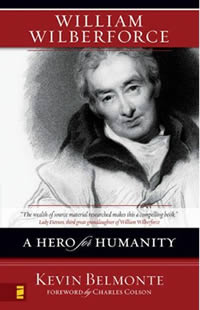Book Review—William Wilberforce
William Wilberforce: A Hero for Humanity. By Kevin Belmonte. Grand Rapids: Zondervan, 2007. 352 pages. $12.99. Purchase: Zondervan, CBD, Amazon
Purchase: Zondervan, CBD, Amazon
Special features: [foreword by Charles Colson, appendix: an original account of Wilberforce’s funeral, a note on sources, and a bibliography]
ISBNs: 0-310-27488-5 & 978-0-310-27488-9
LCCN: DA522.W6 B45 2007
DCN: 326.092 B 22
Kevin Belmonte is a visiting author at Gordon College and the lead historical consultant for the major motion picture Amazing Grace. Winner of the 2003 John Pollock Award for Christian Biography, Belmonte has edited Wilberforce’s classic apologetic work A Practical View of Christianity and served as a script consultant for the BBC. He and his wife, Kelly, along with their son, Samuel, reside in New England. (From the cover)
Because of my prior calloused state toward politicians, I am in debt to this book. The life of William Wilberforce, the great reformer and abolitionist of slavery in England, about whom I previously knew nothing, has arrested my increasing skepticism for Christians to be directly engaged in governmental politics for the advancement of proper morality and civility. In this biographical story of Wilberforce, brought to the forefront by the celebration of the Bicentenary of the Abolition of the Slave Trade Act of 1807, Kevin has woven together a brilliant sketch, substantiated by a mountain of research through source material. After building toward “The Great Change” wrought by God’s grace in Wilberforce’s life, the author shows how Wilberforce’s spiritual transformation resulted in massive political objectives that shook the world. This book should be on all pastors’ or parents’ shelves for valuable encouragement to any young, aspiring politician. In support, the youngest prime minister of England, William Pitt, once stated to Wilberforce, “Surely the principles as well as the practice of Christianity are simple, and lead not to meditation only but to action,” leading Wilberforce away from the “Eusebian temptation” (p. 83).
In historical detail, both accurate and riveting, Kevin takes us on a full journey from Wilberforce’s birth (Aug. 24, 1759) and childhood trauma to his farewell words whispered before death (July 29, 1833) to his youngest, beloved son, Henry, a fervent evangelical minister. The book flows from one chapter to the next chronologically, mapping out the reformer’s life, beginning with foundational impressions on young Wilberforce by George Whitfield, John Newton, and John Thornton—remarkable men, each of them. His young adult years were frivolous since he wasted much time at Cambridge; likewise was his inauguration activity in Parliament. But when God began to work on him through the ardent Christian apologetics of Isaac Milner, his self-confidence shattered, exposing his whole superficial lifestyle before the holy countenance of God Almighty. In spiritual crises, Wilberforce wrote, “I must awake to my dangerous state, and never be at rest till I have made my peace with God” (p. 78). During this stage, John Newton, William Cowper, and Pascal’s Pensees (or Thoughts on Religion) had a big impact on his life. As the Spirit awakened Wilberforce from his slumber, God completely captured his heart. And through his life, Wilberforce would seek to give his all back to His God. He wrote, “My religion taught me the duty of devoting all my faculties and powers as a debt of gratitude to my reconciled Father in Christ Jesus, as well as of reasonable service to my Creator, Preserver, and continual Benefactor” (p. 207).
His mother worried he would turn into one of those foolhardy “enthusiasts.” With scorn, others stated he had lost it and become “melancholy mad” (p. 81). Looking at the time after 1786, his life had assuredly changed. Soon, on May 12, 1787, sitting under a mighty, old oak tree (oh, I wish I could have this tree planted in my backyard), Wilberforce conversed with William Pitt and William Grenville, resolving from that day forward to confront the British slave trade. For the next 20 years through hardship, death threats, and loneliness, he relentlessly worked on destroying England’s connection with the horrors of slave transportation along the Middle Passage. The final victory came on February 23, 1807 (God preserved John Newton’s life to see victory before he died on December 21, 1807).
There is no doubt that William Wilberforce is a hero to Kevin Belmonte, compelling us all to make him a hero for humanity. Kevin’s love for Wilberforce is demonstrated by the amount of time he has spent meticulously working through the historical, biographical classics as well as spending time with members of the Wilberforce family. The only drawback to this paperback edition (2007) is the absence of documentation to his sources through footnotes or endnotes. But the author gives the following disclaimer at the end of the book: “For a complete documentation of all sources consulted for this book, readers should consult the first edition (published by NavPress in 2002)” (p. 347).
This particular biography of William Wilberforce is both delightful and deeply profound for a number of reasons. First, for just plain fun, I identify with Wilberforce’s love for reading; whether philosophy, poetry, politics, fiction, travel, theology, he devoured it all. In fact, a friend remarked, “He kindled at the very sight of books” (p. 94). In this volume, Kevin dishes out a huge sampling of all the various authors that occupied Wilberforce’s insatiable appetite for mental sharpening.
Second, Wilberforce formulated all his core principles from the Scriptures, firmly believing that “we should really make this book the criterion of our opinions and actions” (p. 89).
Third, a very moving scene in the book occurs when Kevin shares a good segment of John Newton’s letter (pp. 136-138) to Wilberforce during his great discouragement in 1796 after a nervous breakdown from the onslaught of difficult opposition. Though I have never explored the initial decisions, no doubt this very letter by Newton to Wilberforce could be one of those inspirational motivations behind World Magazine’s formulating the “Daniel of the Year” award. The pages will gird up the loins of the Christian reader’s heart to be faithful to Christ even when considered pariah by peers. Get the book for these pages alone.
Fourth, chapter 8 on “Home and Hearth” sets the example in familial joy. His sons, Robert and Samuel, wrote, “[Our father] was beloved in general society; but if he sparkled there, he shone at home. None but his own family could fully know the warmth of his heart … the full sunshine of his kindliest affections” (p. 253).
Fifth, let me conclude with Wilberforce’s true words of ecumenicity framed by the author Kevin Belmont:
Wilberforce told Jay [pastor of Argyle Chapel in Bath, a dissenting chapel], “The best way to reduce an undue attachment to the subordinate things in religion … is to keep up a supreme regard to the more important ones… . For then we shall have little time and less inclination to engage in the strivings and strifes of bigots.”
Agreement on the basic orthodox tenets of the Christian faith was what mattered most to Wilberforce. Denominational distinctions meant little to him, for they too often precluded any possibility of mutual cooperation and edification. “Though I am an Episcopalian by education and conviction,” he once said, “I yet feel such a oneness and sympathy with the cause of God at large, that nothing would be more delightful than my communing once every year with every Church that holds the Head, even Christ.”
There was, Wilberforce confessed, “much in the state of the world and church which I deplore, yet I am not among the croakers. I think real religion is spreading; and, I am persuaded, will increasingly spread, till the earth is filled with the knowledge of the Lord, as the waters cover the sea” (p. 331).
Before you rent the soon-to-be-released DVD Amazing Grace for home-viewing pleasure, read the book. The book is always better then the movie. Well, at least in most cases.
 Todd Wood is pastor of Berean Baptist Church (Idaho Falls, ID). He received his B.A. in Missions, M.A. in Theology, and M.Div. from Bob Jones University (Greenville, SC). But more than anything he hungers for the A.I.G. degree affixed to Apelles (Rom. 16:10). He also operates a blog called Heart Issues for LDS. Todd Wood is pastor of Berean Baptist Church (Idaho Falls, ID). He received his B.A. in Missions, M.A. in Theology, and M.Div. from Bob Jones University (Greenville, SC). But more than anything he hungers for the A.I.G. degree affixed to Apelles (Rom. 16:10). He also operates a blog called Heart Issues for LDS. |
- 8 views


Discussion